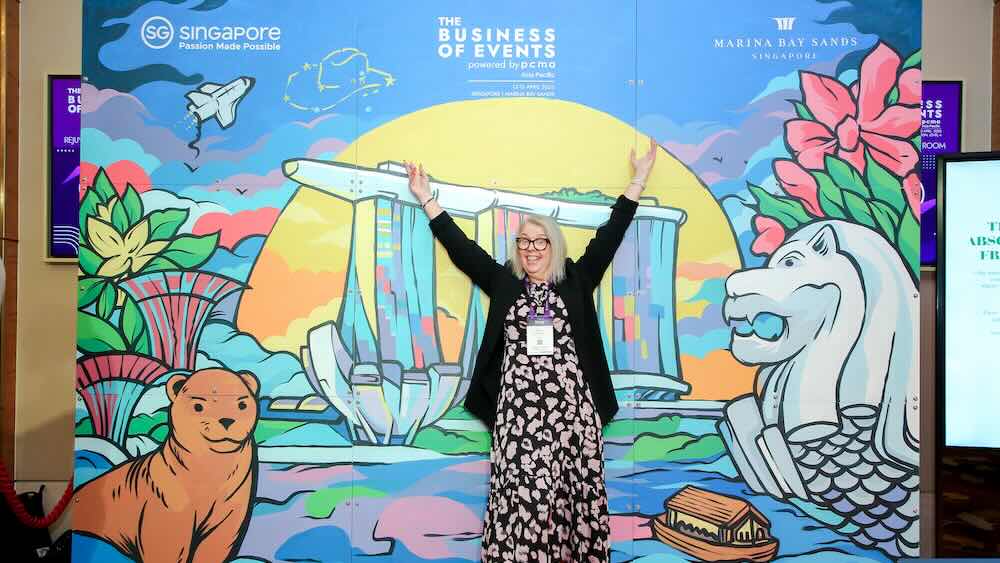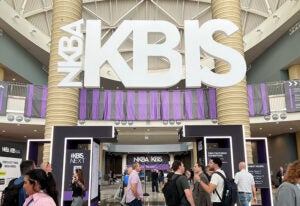


Anne Jamieson, CEO, Saxton Speakers Bureau, poses in front of artist David Maldonado’s sustainably produced mural at PCMA APAC The Business of Events in Singapore.
For the second consecutive year, PCMA APAC The Business of Events (BOE) was held at Marina Bay Sands Expo & Convention Centre in Singapore. A triple platinum certified venue — with accreditations from Building and Construction Authority, U.S. Green Building Council, and the Events Industry Council — Marina Bay Sands as the host venue was foundational to “showcasing how events can be sustainable and progressive,” said Meridith Beaujean, Marina Bay Sands’ executive director of sustainability. Convene asked Beaujean to break down the environmentally sound elements that helped this year’s BOE, held April 13-15, raise the bar, and to share her insights on what’s next in sustainability for the business events industry.
Starting With Easy-to-Implement Initiatives
BOE used digital event signage and menu cubes with QR codes to eliminate paper collateral. The menu cubes are made of upcycled chopsticks, giving a second life to materials that are usually discarded after use. Instead of single-use bottles, delegates were encouraged to use water dispensers, and multi-stream recycling bins situated around the venue made it easy for delegates to sort their waste accordingly.
Art Lesson in Sustainability
BOE participants were greeted with a commissioned piece of artwork that had a sustainability story to tell at the event entrance. The mural was designed by Houston-based artist David Maldonado “as a tribute to Singapore,” Beaujean said, “featuring Marina Bay Sands’ iconic architecture, Gardens by the Bay, the Merlion, and the smooth-coated otters that reside around Marina Bay.”
The artist painted the mural alongside more than 600 delegates at PCMA Convening Leaders 2025 in January in Houston using limewash, a paint that absorbs carbon dioxide from the air as it cures. The artwork, Beaujean said, reflects “delegates’ active commitment to a net-zero future where business events and sustainability work in harmony.”
Meridith Beaujean, Marina Bay Sands’ executive director of sustainability
Sustainability and Wellness Go Hand in Hand
Sustainability also works in harmony with wellbeing initiatives, which were intentionally woven into the BOE program and “warmly received by delegates,” Beaujean said. “Throughout the conference, attendees were invited to experience THRIVE, a suite of wellness experiences aimed at boosting delegates’ focus during events and helping them build resilience.” THRIVE activities include Energy Forecasting, a technique to identify activities that deplete and refuel energy, Empathy Mapping to gain a deeper understanding of others, and Sound Meditation to facilitate a shift in consciousness.
Food Is ‘a Unifying Topic’
Beaujean said that she has found that event organizers who meet at Marina Bay Sands — even those who want to start small with their sustainability plans — are often most keen to introduce sustainable dishes to delegates. “These can serve as a conversation starter and also inspire delegates to think about their environmental footprint over mealtimes,” she said. “We believe in sourcing locally or regionally where possible, to minimize our carbon footprint. Our skillful culinary team can also whip up delectable plant-based menus upon request.”

Ingredients for the treats at the dessert stations were sourced locally.
While “meals catered to the varied needs of BOE delegates were not entirely plant-based,” she said, “ingredients were sourced locally and regionally where possible, with the culinary team using herbs from our on-property herb gardens to garnish dishes. These included savory items such as the cauliflower and tagliolini, as well as sweet treats at the dessert stations.”
The venue’s two herb gardens “were planted to support the Singapore government’s ‘30 by 30’ goal,” she explained, “of producing 30 percent of our nutritional needs locally by 2030.”
Addressing Food Waste
Efforts to tackle food sustainability started more than a decade ago at Marina Bay Sands, Beaujean said, with the purchase of aerobic food digesters to process waste into non-potable water. “More recently, we invested in proprietary technologies such as the WasteMaster, becoming the first hotel in Singapore to use such cutting-edge innovations to handle food waste. The WasteMaster processes waste into a nutrient-rich substrate, which is further transformed into pellets to feed fish at a local aquaponics farm. The fish waste is later used to fertilize vegetables sold at supermarkets or directly to restaurants.
“We also leverage artificial intelligence to manage and track food waste in select kitchens, and to measure the quantity and type of food waste. These data insights help chefs to better plan portion sizes and reduce over-ordering.”
While technology “makes a substantial impact and goes a long way in managing food waste,” Beaujean said that it is only “one part of our workstream.” Marina Bay Sands also partners with organizations including The Food Bank Singapore to donate unserved food to communities in need. “These are typically banquet dishes which we freeze in blast chillers to ensure they are safe for future consumption,” she said. “Up to 12,000 kg of food waste is diverted daily through these actions, and we continue to explore new ideas to boost our productivity.”
In addition to putting the aerobic digesters and WasteMaster into use during BOE to reduce the amount of food waste going to landfills, cooking oil from the kitchens was recycled at a partner facility, Beaujean said, “finding new value as aviation fuel.”
What’s Next In Event Sustainability
“Circularity is the next big conversation starter at events,” Beaujean said. “Organizers are starting to think beyond incorporating standalone sustainability measures at events. Increasingly, there is more awareness among organizers and delegates alike on closing the loop in recycling and circularity. That means breathing new life into byproducts and ensuring they are repurposed.”
She gave the example of Vinexpo Asia, held May 27-29 at Marina Bay Sands, bringing together international wine producers and Asia’s trade buyers. “This year, we worked with them to upcycle glass bottles,” Beaujean said. “A portion of them was sent to a local artist to be turned into a sustainable artwork, while the rest of them were sent to a glass recycling factory, which will be melting them down and turning them into new glassware.”
In Beaujean’s view, sustainability is not at odds with luxury hospitality. “Even as we present guests with world-class hospitality experiences” at Marina Bay Sands, she said, there are many ways — including the best practices and cutting-edge methodologies and technologies deployed at BOE — “to lower our environmental footprint.”
Michelle Russell is editor in chief of Convene.








